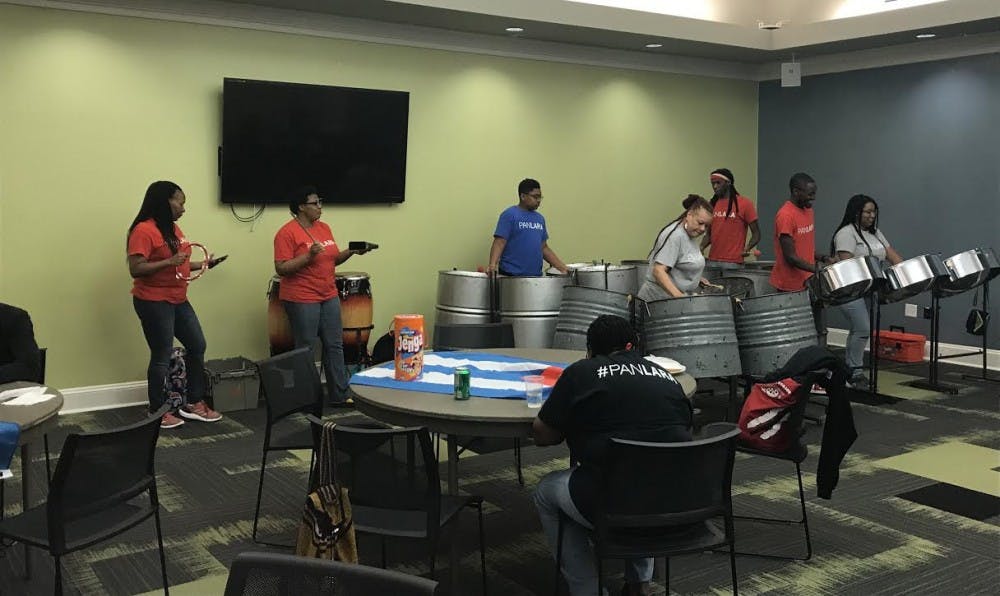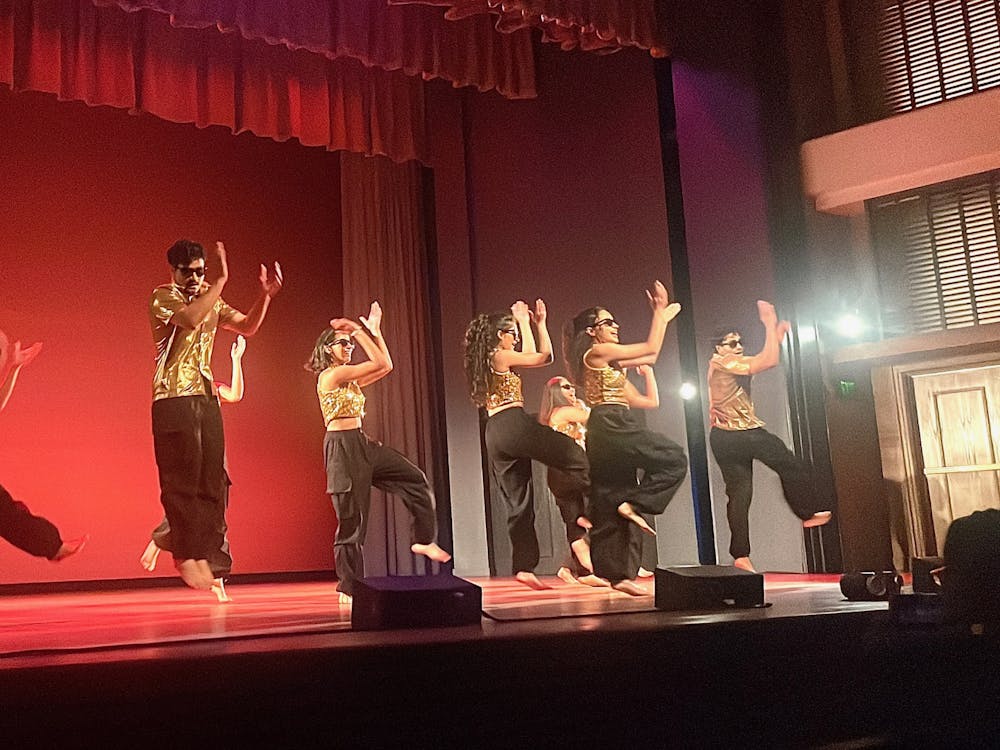To many, the word “orchestra” may immediately call to mind the image of fluffy-wigged Bavarians dressed in stately suits, standing before a throng of musicians ready to play classical music with violins, cellos and harps.
But students who attended an hour-long concert organized by West Indian Lynk in the Web Friday evening learned that an orchestra that produces beautiful melodies can take many forms, including a small group of people tapping, thumping and banging on pans made of steel.
The concert was part of an event called Limin’ Out, hosted by West Indian Lynk for students to socialize, play games and eat Caribbean food. The organization invited members of PanLara Youth Steel Orchestra, a group of steel pan players based in Washington, D.C., to come to UR to play for students and teach them a little about the culture from which it originates.
Debbie Lara, the manager of PanLara, said that the practice of playing music on the steel pan, also known as the steel drum, has a long history in the Caribbean that she believes it is her mission to teach.
“The steel pan comes from Trinidad and Tobago, an island nation off the coast of Venezuela, and it’s their national instrument,” she said. “And so it’s very important to Trinidad and just the Caribbean in general because it started off as just a discarded oil drum that had been cut into different sizes. And its music is phenomenal.”
A steel pan orchestra is composed of musicians playing a variety of pans of different shapes, sizes and materials. They work in tandem to produce a versatile kind of sound that most are probably familiar with, even if they do not know of its origin.
“It’s an instrument that has been played with different types of melodies, from reggae to calypso to R&B, to classical,” Lara said. “You can play anything on that instrument.”
PanLara draws its members from young people around the Washington metropolitan area, according to its website. It was founded in 2005 with Lara’s own children practicing the steel pan. In the years since, it has grown into an organization that has been featured on the radio, regularly hosts cultural festivals and conducts international tours.
“Our group is a youth group, so we’re just trying to spread our culture, and the best way is through music and steel pans,” Lara said.
PanLara also held a free workshop to teach students some of the basics of the steel pan at noon on Friday, April 26 in Tyler Haynes Commons.
First-year Ciera Bryant, a West Indian Lynk member who attended the workshop and learned how to play the tenor pan, said it made her wish that she had more opportunities to experience Caribbean culture on campus.
“After the workshop, I wished that Richmond had a steel pan orchestra, because it’s a culture that not many people know about,” Bryant said. “And for me, being Caribbean, it’s just an experience I never went through before, and I was so happy to do it.”
Enjoy what you're reading?
Signup for our newsletter
Junior Nia Cambridge, president of West Indian Lynk, helped organize the event. She said she had been in communication with Lara to organize PanLara’s visit to UR since February.
“We wanted to do something where people could really see our club and really experience Caribbean culture as well,” Cambridge said. “We’re a Caribbean student association, but one of our goals here is to also spread Caribbean culture. So we asked ourselves, ‘What are some creative ways that we can get people involved and get them learning about these things and recognizing them?’”
The West Indian Lynk leadership concluded that inviting PanLara, which also came to UR in 2015, would be a way to do just that. The steel pan concert, Cambridge said, would spur students to think about the origins of things they might otherwise take for granted.
“I think getting people to realize that there’s a whole culture behind it, that it’s not just vacation resort music, is really cool and really interesting,” Cambridge said.
After the concert was over and the members of PanLara had packed up their pans and prepared to return to Washington, Cambridge said she thought the day’s events were a success and that she was interested in inviting PanLara back in the future.
“I definitely would like to invite them back,” Cambridge said. “It’s an expensive workshop to do, but given the opportunity, I would like to have them back more frequently.”
Lara agreed, and said that returning to UR would give PanLara another opportunity to fulfill its mission of sharing Trinidadian culture.
“Any chance that we get to come to your university or to any place, we are proud to showcase our talents and our culture,” Lara said. “And we just want this thing to go viral. We want more people to know about it. I want others to have the same excitement for it that I do.”
Contact news contributor Hunter Moyler at hunter.moyler@richmond.edu.
Support independent student media
You can make a tax-deductible donation by clicking the button below, which takes you to our secure PayPal account. The page is set up to receive contributions in whatever amount you designate. We look forward to using the money we raise to further our mission of providing honest and accurate information to students, faculty, staff, alumni and others in the general public.
Donate Now



